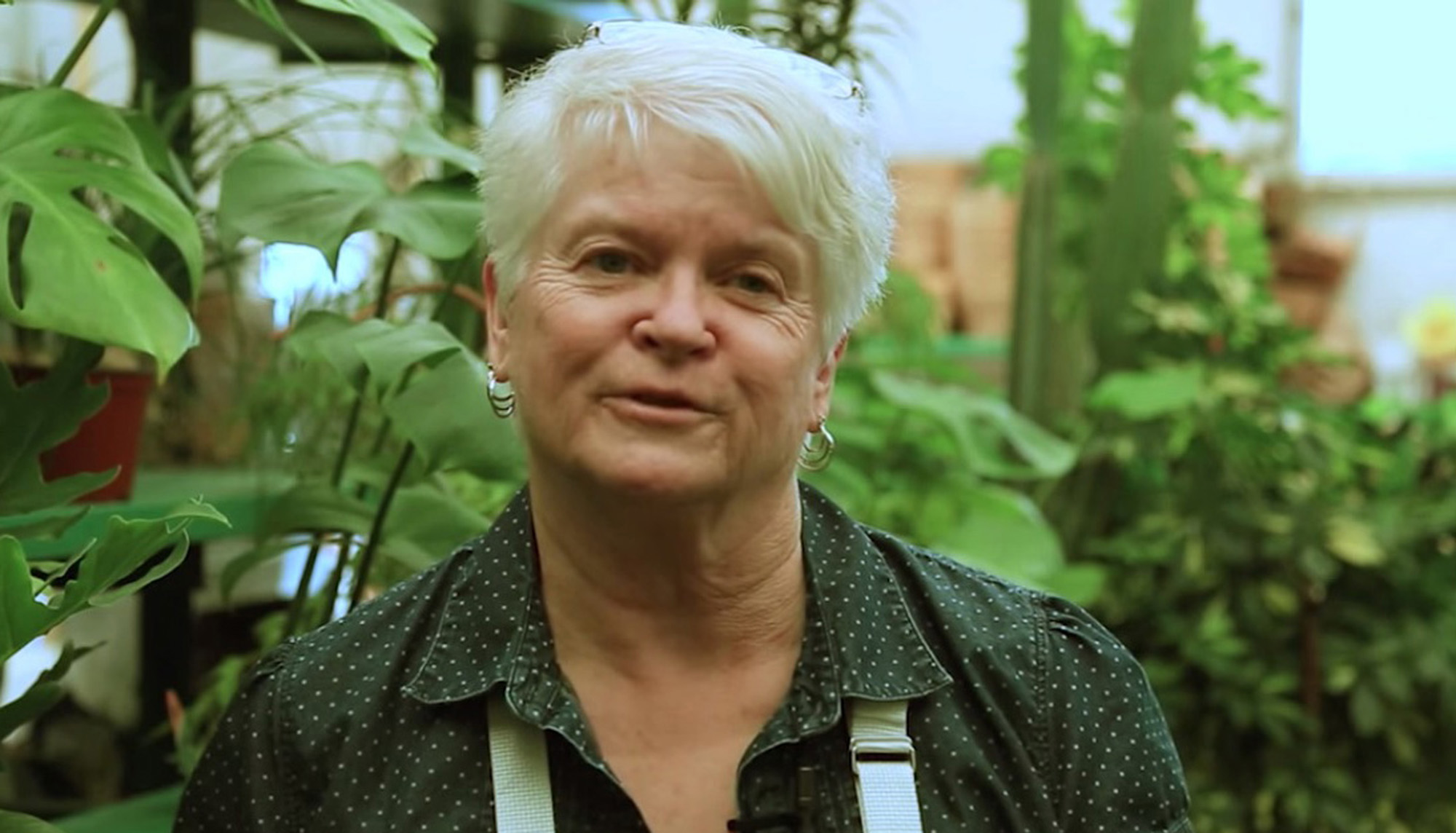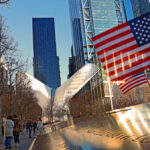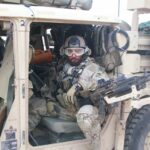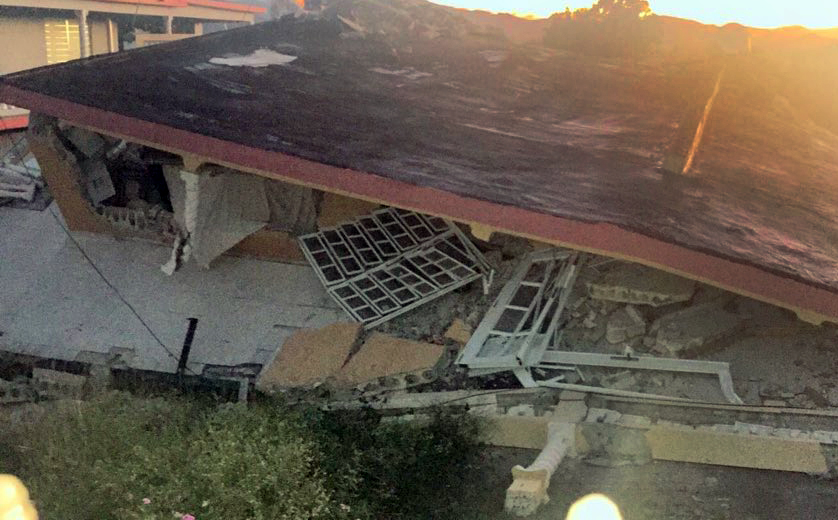
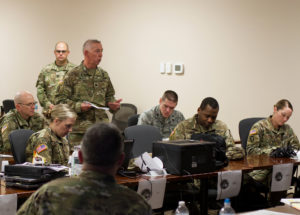
Soldiers and airmen pound on keyboards. They talk with faces glued to monitors as if they are talking to the computers and cables, their words a staccato of high tech jargon. Chaos monkey. Button masher. Clicktivism. The cloud. Data boomerang. Death by tweakage. Enterprise data. Hamster dance. Huge pipes. Ijack.
And in walks Kentucky Army National Guard Chaplain (Lt. Col.) Bill Draper. This kind-hearted, soft-spoken native of Georgetown, Kentucky, won his way into the hearts of the highly caffeinated, top-of-the-line information technology soldiers of Cyber Shield 19.
Draper has thirty-seven years in the Army, eighteen enlisted. He’s been deployed to Afghanistan multiple times and has ministered to military police, combat engineers, and aviators. Now the Kentucky National Guard Deputy Joint Force Headquarters chaplain, he volunteered to provide chaplain service to the soldiers and airmen of the National Guard’s premier cyber training exercise. Cyber Shield 19, held April 5–19 at Camp Atterbury, Indiana, involved about eight hundred personnel from the Army National Guard, Air National Guard, and Army Reserves, and cyber experts from industry as well as local, state, and federal agencies.
It also had one grey-haired, easy-going chaplain.
“Ninety-nine point nine percent of what is said is over my head, but I realize that as the chaplain, the basic needs are all the same,” Draper, who is endorsed by the North American Mission Board, said. When soldiers leave home for training or deployment, they face similar challenges, he added. And a good chaplain is there to support them.
“Chaplains aren’t aviators, they aren’t engineers, and they’re not MPs [military police], they’re chaplains,” Draper said. “Each of those branches and MOSs [military occupational specialties] have their uniqueness, their pride, and their legacy. So as chaplain, when we’re assigned to those types of units, a challenge is to learn what that looks like and learn their heritage in order to connect.”
Draper pulls you in with each word and keeps you engaged with ease. And he wanted to learn all he could about these high-tech troops.
“When the chaplain got here, he said ‘I don’t know what they’re doing, but I can tell they’re doing good things.’ Now he’s hacking hearts and minds,” said Colonel Teri Williams, the commander of Cyber Shield 19.
Technology has come a long way since Draper first enlisted. Back then, typewriters were in use. Now, he uses his cell phone to care for his flock of cyber warriors. He captures notes on his iPhone. He supplements his visits with follow-up text-messaging. He shows troops how to get a daily dose of scripture through smartphone apps.
“I felt honored to be able to interact and help Chaplain Draper as we comforted a soldier whose mother had recently passed. He [Draper] was able to provide a Bible and an .mp3 player to help comfort the solider,” said Sgt. 1st Class Graham Albert of the Florida Army National Guard.
However, these tech-savvy methods supplement rather than supplant. There is no substitute for human-to-human contact for chaplains.
“We do that through ministry of presence. We go around and talk to soldiers,” said Draper, who entered the Chaplain Corps in 2004. “Ministry of presence is simply being around the training areas, work areas, and recreational areas with soldiers. It is engaging and interacting with them in order to build relationships.
“My fundamental approach in providing religious support to soldiers and commanders is getting to know them, their job, family, and faith experiences,” he said. “Once these relationships are made, chaplains have a seat at the table, so to speak, and service members are more inclined to call on them when needed. In addition, I offer worship services, counseling, and crisis intervention as requested and/or as needed.”
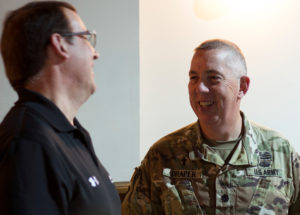
At Cyber Shield 19, he was always on the move. He hopped around from area to area checking on troops, meeting the instructors and staff, providing a quick laugh—or comfort and support.
“It is important to be there for each other emotionally and spiritually in times of need,” Sgt. 1st Class Albert said. “It makes us a stronger force.”
Draper believes the hardest part of exercises such as Cyber 19 is not the mission itself.
“These men and women are well trained and typically exceed standards,” he said. “[The hardest part] is being away from home and missing events like birthdays, graduations, anniversaries, or unexpected tragedies that have no notice such as illnesses, auto accidents, and other types of emergencies. Often during ministry of presence soldiers will approach me asking for prayers for their family and specific situations. They seldom ask prayer for themselves but always for someone else.”
He describes his ministry as challenging but rewarding.
“I would encourage pastors and persons in ministry to explore opportunities to serve as military chaplains or religious affairs specialists because it is a very noble vocation, and the need is great among our troops,” he said.
As Chaplain (Lt. Col.) Draper saw his high-tech warriors in action at Cyber Shield 19, he had no doubt they would succeed and meet their training objectives. And whenever one of his cyber warriors needed him, he was there faster than a bandwidth hugger can send a megabyte of data across a huge pipe.


